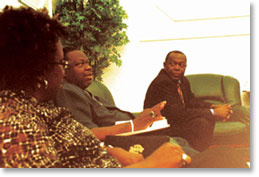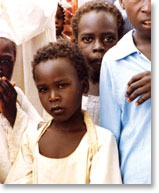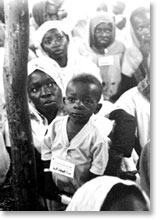FCNNEWSSOURCE
One on One with Rev. Al Sampson
- Darfur: Is it genocide? (FCN, 10-01-2004)
- Sudan needs help, not sanctions – A report from Darfur (FCN, 09-23-2004)
- Darfur: Seeking the truth (FCN, 08-31-2004)

(FinalCall.com) – As pastor of Fernwood Methodist Church in Chicago, lllimois, Reverend Al Sampson has served on the frontlines of the Civil Rights Movement in the streets of Chicago alongside Dr. Martin Luther King Jr. The only minister to be ordained by Dr. King, Rev. Sampson continues to take the lead in righteous activism in the interest of Black community. He has traveled abroad on numerous world tours with the Honorable Minister Louis Farrakhan. With a Masters’ degree in Cultural Studies, he provided an insightful and spiritual perspective as part of the fact-finding delegation called by Minister Farrakhan on the crisis in Darfur. Speaking with Final Call Managing Editor Dora Muhammad, he shared his concerns over Sudan’s humanitarian crisis.
Final Call (FC): Why was it important for you to join the fact-finding delegation to the Sudan?

Reverend Al Sampson (AS): I have had an open forum on the Sudan at my church, because I visited there a year ago with Minister Farrakhan. My Biblical and cultural research has always intrigued me about the Sudan because the Nile River, which flows into Egypt, the land in the Old Testament and New Testament of the Bible whose soil all of the great leaders from Moses to Jesus, touched. As a Biblical scholar for the Original African Heritage Bible, that eastern section of Africa, as well as the northeastern of Africa, has always been religiously challenging to me in my own ministerial growth, and my pilgrimage as a minister.
The Sudan, which has a large deposit of oil, water and other mineral resources, is bound by eight countries, and so I see it as the breadbasket to that part of Africa, which is necessary under the principle of self-determination, in controlling the resources by Africans for Africans, by Sudanese for Sudanese.
I’m also worried about the war in Iraq, because I don’t want the sons and daughters of the Diaspora, Brothers and Sisters in America, to wear military uniforms in the war, killing our Brothers and Sisters in Africa who look like us. There are a group of us in America that does not like violence. In the words of Dr. Martin Luther King Jr., “We’re either going to live together as Brothers and Sisters, or we’ll perish together as fools. It’ll be either non-violence or non-existence.” One of the illustrations he gave was that, in Birmingham, we said “Thou shall not kill” and “Turn the other cheek,” so we should not go to Vietnam and destroy peoples’ lives as a solution, with the pathology of violence.
We should not have young Black males and females landing on the shores of Africa, fighting Africans who are our kinfolk, for justifiable or unjustifiable wars. We tell our people to stop the Black-on-Black crime and violence, because we see young Black males, specifically, perpetrating violence against each other and our communities with weapons that they don’t manufacture. So, the conflict in Sudan is a reflection of what happens in the streets of Black America every day.
The difference is, in Black America, we’re not fighting for assets but, in Africa, they’re fighting for assets and resources. It disturbs me that, in the Sudan and other parts of Africa, the world would have us believe it is only tribal wars, when the hidden hand is world powers–from Russia, China, Europe and America–destabilizing Africa, like forces in America destabilize African American communities. We get moved off our land, with land-grabbing language and schemes: urban renewal, gentrification, displacement of housing, and Section 8 giving us the mobility in certain communities, but it breaks up the political and economic power of our communities.
Even before our experience of the trans-Atlantic slave trade, there has been this destabilization, economic exploitation, and destruction of the land and the people, for resources, moving our people as pawns in a chest game by military industrial complexes in Asia, Europe and America.
FC: What is the responsibility of Black people in the Diaspora to the Sudan, and Africa in general?
AS: Africans in America have a unique opportunity and responsibility to influence foreign policy with their economic and political strength. The church cannot be silent, sending missionaries to the continent without a mission, with a Bible and a denomination, while economic forces that belong to these denominations sit in the seat of governmental responsibility with an agenda for economic exploitation of our peoples’ resources.
We have an opportunity to make a difference in five key areas. One, the 530 Black mayors, several thousand county and other elected officials, along with our state officials or state legislators, and the Congressional Black Caucus have an opportunity and responsibility to develop institutions at home and abroad that will serve Africa. Two, our academic institutions, especially our land grant colleges, can adopt the Sudan, offering seeds, agricultural technology, a land preservation bank, technical assistance and an exchange of professors and students.
Three, in the Black media, we have 250 Black newspapers, talk radio and access to cameras. We have created a strong, multimedia, computer, web-casting system within the African American community. We should have a communication system on behalf of the Brothers and Sisters in the Sudan, so that we can tell our story as Africans in America, rather than it being filtered through the eyes of BBC, Reuters and ABC. African American newspapers ought to have a section identifying an African page and a Caribbean page, and hook up with newspapers on the ground in the 53 African countries, especially the Sudan.
Four, our churches and mosques that work together in America as Muslims and Christians have a responsibility to create links, because Africans in America are the most advanced group of people inside the culture of Africans, on the continent and in the Diaspora. We should have economic and cultural arrangements through our churches and re-weave the history of our religion and culture, our cloth and artifacts that have been taken away from us and severed by demonic forces that have tried to destroy us.
Five is the business and economic development wing of the Black community. It is tragic that students go to White colleges, learn geology, but do not go to Africa to mine the gold, silver and the oil, as African companies learn the technology in America. It is tragic that Africans, who came to America, stay and get caught up in the playpen of America, rather than develop the companies for import/export under the laws that have been legislated to do business in Africa.
It is tragic that major, predominantly African American cities, from Atlanta to Detroit, that have automobile manufacturing facilities, have unemployed Brothers and Sisters, who know how to put an automobile together. Some know how to steal an automobile, fix it up, and put it back together again. There are auto mechanic shops and tire shops all over Black America, yet we don’t have any Blacks in America unemployed, underemployed or employed to go to Africa and build an African car. While Brothers are fighting Brothers, being manipulated by foreign forces outside of the culture and the economy of the Sudan, the people are starving, they’re being displaced.
FC: How can ordinary Black people help ease the humanitarian burden caused by the crisis?

AS: Africans in America must rise to the occasion and provide the resources. Every African American ought to give up a blanket to the Brothers and Sisters in Africa. Medical schools should send doctors, nurses and medicines. We can’t have a dashiki hanging in our closet, and ebony statues in our plush offices, and the luxury of playing retirement with nothing to do but go to the casino and take foolish trips to Disney World, when we ought to be committed as a people to do what every other culture does.
Koreans in America are rebuilding Korea. Vietnamese in America are rebuilding Vietnam. Chinese in America are rebuilding China. Pakistanis and Indians living in America are rebuilding their countries with the art of the computer. Jews in America have developed a bond financing strategy to rebuild Israel. The blueprint for the mutual cooperation of cultures has already been laid out and our hip hop, church and business communities need to adopt the Sudan as one of the greatest breadbaskets among other sections of Africa.
FC: Are there any concrete plans to answer the calls for humanitarian aid to Darfur?
AS: We have heard from (W.E.B.) DuBois to (Marcus) Garvey, Martin King to Elijah Muhammad, Fannie Lou Hamer to Septima Clark–all of the heroes and sheroes of our community have said to us, and Malcolm X said it better, “If you can’t even go to Africa, your mind ought to be in Africa.” So, we’re going to follow the wisdom of our prophets, heroes and sheroes of yesterday, follow their footprints of wisdom back to the Sudan and establish a humanitarian effort, in coordination with the Nation of Islam.
We’re going to call on churches and colleges to bring seeds to Africa, because we found that part of the poverty depicted in the Western press is caused by the holding back of resources, when farmers in America burn the food because of the prices, throw the food away so that 10 seed companies in America that control the genetic engineering of food can replace the agricultural schools to develop a seed strategy. We found in Sudan that the whole poverty strategy grows out of this genetic engineering strategy that they’re trying to place in the bellies of children in the Sudan, and all over Africa, which in turn will destroy the ecosystem of Africa.
FC: If you ask the Black people and leaders who have protested in front of the Sudanese Embassy, they consider their actions positive and just; in their minds, they’re fighting for a “regime change” of the Sudanese government. Is there a gap in our understanding of our connection and potential role in terms of the development, rather than the disintegration, of the infrastructure of African countries?
AS: You have to gather information and you have to educate the public. You have to go see and you have to talk to everybody. For some people who are fighting on the streets of Washington, in front of the Sudanese Embassy, it’s kind of impossible for them to do that. But Congressional Black leaders have now started going to the Sudan and listening. They cannot create a movement with third-level information.
But the movement can have several levels of participation. The Sudanese government is not exempt from the blood of the people on their hands, because government is responsible for all of the people. At the same time, there are forces outside of the Sudanese government being backed by the hidden hand of European forces. For (Secretary of State) Colin Powell to talk about genocide and hire the American Bar Association, without having the National Council of Black Lawyers go to the Sudan and open up a tribunal of Black lawyers–Johnnie Cochran and Willie Gary in Florida, and some of the top Black lawyers, can get on a plane financed by Oprah Winfrey, Bill Cosby and Magic Johnson and establish a tribunal.
I remember when Adam Clayton Powell blocked off the streets in Harlem and had a testimonial hearing of the poverty in Harlem. So, Black people who have economic, educational and financial resources can get commissioned by the Sudanese government. They don’t have any problem; we’ve gone in and out of the Sudan, and we can go back.
Some of the people who are protesting can go and see for themselves, but they also must see that the weapons of mass destruction that are left in the ground and in the body of the people in Sudan have marked on them, “Made in Russia,” “Made in China,” “Made in the USA” and “Made in Europe.” The Sudanese do not manufacture weapons of mass destruction. It’s always the hidden hand of these foreign governments, because they want the resources in Africa.
FC: Do you believe that we, in America, have failed in the development of the African continent?
AS: I think that Africans in America have grown up now to be able to handle Africa. We’re the only hope for Africa to save us and for us to save Africa. In my church, I’m putting together a Department of African and Caribbean Affairs, where I’m going to identify 53 people from African countries or that want to work with the countries in Africa and 27 Caribbean countries. I’m trying to get all of the flags of every African country, because we have got to bring Africa into our house and neighborhood, because there isn’t one Hispanic community that doesn’t wave the flag of their particular country. We are the only group of people who does not have flags representing all of the countries that God has given us as a gift.
So, I think that we need to thank God for the gift for giving us 53 African presidents and 27 Caribbean presidents, and not just one president sitting down there on Pennsylvania Ave. We haven’t taken the responsibility to free ourselves, as well as our Brothers and Sisters in Africa, from the hidden hand.
FC: What is the solution to the pathology of violence in the Sudan, and Africa in general?
AS: The solution is real simple. A month ago, an imam, a holy man, Sistani walked into the town of Najaf and told the United States government to stop the bombs, the planes, the radar, to shut down the satellite, told the soldiers, both Black and White in the foxholes of the sand to put their rifles down, and told the freedom fighters to put their weapons down, in a ceasefire. There are enough African bishops, preachers, holy people as Africans in America. If we put together a strong humanitarian program, the Brothers and Sisters in Sudan will put their weapons down.
But only Holy people can make violent people put their weapons down. What we have to do is not have the spirit of fear, but have the spirit of faith that we are holy people and we need to stop the Black-on-Black violence toward each other from America to Africa. There has to be an alternative that Dr. King laid out when he said, “It’s either non-violence or non-existence.” We will teach White people to lay their arms down, because they are not going to be able to conquer the world with their airplanes, missiles and computer military technology–which is what the holy man proved, because they couldn’t solve, and they cannot solve problems through violence. Black, Latino and White soldiers didn’t have any problems that a holy man, who wasn’t a Christian, saved their lives so they could get back to their families safe and sound.
So, we need holy people that will see this as a humanitarian effort and get on the shores of Sudan, by any means necessary, and say, “This war cannot occur anymore. This tribal feud must stop, because the hidden hand is trying to destroy all of us, from Africa to the Americas. Our God is one and so are we.”
FC: Thank you.












